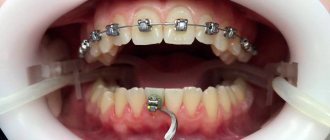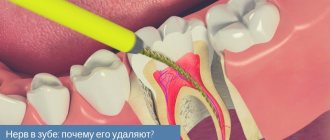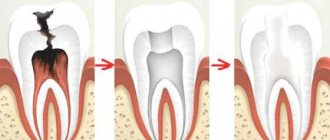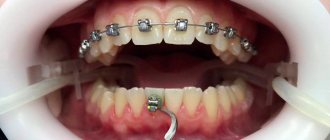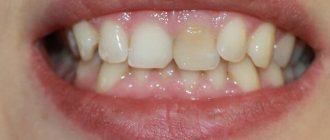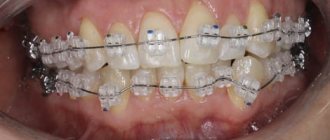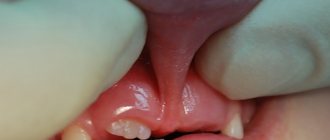Certificate of oral sanitation
is an official document that confirms the patient’s dental health. This certificate is issued by a dentist after a thorough examination of the oral cavity and the sanitization itself.
What is oral sanitation?
Sanitation
is a complex of therapeutic and preventive measures at the dentist. Depending on the condition and health of the teeth, oral sanitation may include:
- Treatment of caries and pulpitis;
- Professional oral hygiene;
- Treatment of periodontal diseases;
- Removal of diseased teeth.
To carry out sanitation, the patient must visit the dentist by appointment, undergo an examination, and obtain a medical report. If the teeth are in order, a certificate is issued immediately; If there are dental diseases, they must be treated first. And only after all the procedures, the dentist gives a certificate of sanitation of the oral cavity - with the seal of the dental clinic or clinic and with the signature of the attending physician. The certificate is always issued in a standard format and is accepted in all medical institutions.
Important:
A certificate of oral hygiene can be obtained from both public and private dentistry. Therefore, if it is urgently needed, it is better not to waste time in queues at a government agency, but to go to a trusted clinic with high-quality medical equipment.
In what cases and why is a certificate from a dentist necessary?
How to get a certificate of oral sanitation? | Dentistry As-Stom | St. Petersburg (SPb)
Ask a question to the doctor
A certificate of sanitation of the oral cavity is a document that is often required before serious surgical interventions, the child’s admission to kindergarten or school, before a long business trip or travel during which dental treatment is not possible, or before performing a certain type of work (for employees harmful chemical or food production, for example). What lies behind the words “oral sanitation” and what exactly needs to be done to get the coveted certificate?
Certificate from the dentist for surgery
If the patient is undergoing a major operation in the near future, a certificate from the dentist is needed among other documents confirming the patient’s health. A dentist's opinion can reduce the number of complications after surgery. Our oral cavity and teeth are connected by blood flow to the entire body, and if a focus of inflammation remains somewhere, this can seriously harm a person already weakened after surgery.
In addition, during the operation itself or during the rehabilitation period, existing dental diseases (caries, pulpitis, periodontitis) can worsen and cause complications. That is why, before a planned operation, it is necessary to treat all teeth at least a month in advance, make sure that nothing threatens the health of the oral cavity, and obtain a certificate, without which the surgical operation will be impossible.
What is oral sanitation?
Sanitation (from the Latin sanatio - treatment, recovery) is a whole range of measures aimed at eliminating disorders and diseases of the oral cavity and general dental health. In other words, this is everything that is required to maintain healthy teeth.
Oral sanitation includes:
Professional teeth cleaning (removal of tartar and plaque, cleaning of interdental spaces)
Treatment of dental caries (all carious cavities, as well as the initial stage of caries)
Treatment of complications of dental diseases ( pulpitis , periodontitis )
Prosthetics and implantation of missing teeth
Removal of damaged or hopelessly diseased teeth
Elimination of foci of infection (treatment of gums and inflammation in the oral cavity)
Correction of deformed teeth and orthodontic treatment
Thus, about a patient who has undergone complete sanitation of the oral cavity, we can say that from a dental point of view he is a relatively healthy person, and he has taken all measures to prevent diseases of the teeth and gums.
What is included in the rehabilitation
It is recommended that every person undergo therapeutic and preventive health measures once every six months. This will allow you to promptly detect and eliminate carious lesions and other problems at an early stage, avoid sudden toothaches and keep your teeth healthy. Upon completion, a certificate of oral sanitation is issued. There are four forms of treatment and preventive measures:
- one-time For example, to register a child for school or to find a job;
- individual. A person, on his own initiative, turns to a dentist to assess the condition of the oral cavity and, if necessary, undergo a set of medical procedures;
- periodic. For some people, sanitation is a mandatory procedure (in accordance with the medical examination plan);
- planned (therapeutic and prophylactic). It is prescribed to check the condition of teeth and gums to maintain optimal levels of oral health. Routine inspections are carried out in schools and preschool institutions, and at many hazardous industrial enterprises.
There are no contraindications to sanitation. In the presence of some chronic diseases, it is carried out more often than once every six months. This applies to people suffering from diabetes, tonsillitis, asthma and cardiovascular pathologies. Therapeutic and preventive measures may include the following manipulations:
- treatment of various diseases of the oral cavity (in particular, elimination of carious lesions);
- removal of molars and premolars;
- restoring the integrity of the dentition using fillings (and in some cases, prosthetics);
- elimination of inflammatory processes;
- removal of tartar and plaque (via ultrasonic cleaning);
- correction of malocclusion.
How is oral sanitation performed?
Sanitation of the oral cavity can be a rather lengthy process - especially if the oral cavity is in a neglected state, and teeth will need to be treated in several steps, for example, with prosthetics or pulpitis. Therefore, if you need a certificate of sanitation at a certain point, you should take care of going to the dentist in advance and determine what procedures and in what quantity will be required, and what amounts will have to be spent on treatment.
Therefore, sanitation always begins with an examination by a dentist-therapist and the prescription of treatment. At this stage, an orthopantomogram of the teeth (panoramic X-ray image of the oral cavity) is taken, which makes it possible to accurately determine all diseases, including “dormant” ones, such as a maturing dental cyst .
Get it yourself or buy it?
A certificate from a dentist is a document confirming that the teeth and gums in the patient’s mouth are in healthy condition and cannot cause any infection. Such a document may be required in a variety of life situations. For example, if it is necessary to go to hospital for any operation or when registering during pregnancy.
Why is it better for pregnant women to buy a certificate from a dentist than to go to an appointment?
The main difficulty in officially obtaining this document is that the doctor will only issue it if the gums and teeth are truly healthy. Otherwise, you will need to undergo treatment first. Some teeth may need to be removed and others need fillings. Naturally, with such a development of events, it will not be possible to obtain a certificate in one day. However, there are situations when it is needed very urgently.
If you recently visited the dentist and are sure that your oral cavity is in perfect order, you can refuse to visit the dentist’s office again. It is enough to buy a certificate from the dentist. This will allow:
- save a lot of effort (despite the abundance of all kinds of dental clinics, there are still long queues, especially in government institutions);
- save yourself from additional unpleasant experiences (there is no doubt that visiting the dentist gives at least a little pleasure to someone);
- in the shortest possible time and without any bureaucratic delays, receive the necessary document for submission to one or another authority.
Sample certificate of oral sanitation
The first line indicates the number of the certificate issued. On the second, the doctor writes the patient’s first, last and patronymic names. The third indicates his age and who issued the certificate. Next comes a column to indicate the conclusion and recommendations. The doctor puts the date of issue at the bottom left and his signature on the right.
Sanitation of the oral cavity is a fairly important measure, which is prescribed in many cases. A certificate of its completion may be needed upon admission to kindergarten, school, universities, before surgery, during pregnancy and before childbirth. The main task of sanitation is to identify problems with teeth or gums. If they are detected, the doctor prescribes the necessary treatment measures.
{SOURCE}
Stages of a full range of events
A full range of treatment and preventive measures consists of the following stages:
- examination by a dentist;
- identifying a problem and making diagnostic assumptions about the need to solve it;
- taking an x-ray of the problem area;
- ultrasonic cleaning, removal of plaque and tartar;
- drawing up a plan for further therapy (if necessary);
- referral for consultations to highly specialized specialists, for example, surgeons or orthodontists (if occlusion disorders and other specific problems are detected);
- carrying out health procedures;
- coating of teeth with a special gel polish, which contains calcium and fluoride;
- providing an opinion from a specialist;
- drawing up an individual additional schedule of visits (if necessary).
For pregnant
In order to avoid problems with teeth and gums during pregnancy, it is necessary to take care of your dental health even before pregnancy, at the planning stage. If everything necessary to eliminate existing dental problems is carried out in a timely manner, the development of concomitant pathologies can be minimized. Some of the most common oral problems experienced by pregnant women include:
- Development of caries due to disturbances in the acid-base balance.
- Weakening of the protective properties of tooth enamel due to changes in the mineral composition of saliva.
- Deterioration of enamel due to loss of calcium.
- The development of gingivitis as a consequence of changes in hormonal levels.
In modern dental clinics, sanitation of the oral cavity in pregnant women is carried out extremely carefully in order to minimize possible risks. For a safe and successful outcome of this procedure during pregnancy, the dentist needs to know the current stage of pregnancy. This is important for the selection of therapeutic manipulations during this period. If there is an urgent need for tooth extraction, it is best to carry out this and other dental procedures in the second trimester, since it is during this period that the effect of medications on the fetus is minimal. After the examination, the specialist will give recommendations on the selection of individual hygiene products to maintain the oral cavity at a normal level. In case of inevitable tooth extraction, or treatment of advanced forms of caries, manipulations will be carried out using anesthesia, which is permitted during pregnancy. A conclusion on the sanitation of the oral cavity is required by a gynecologist during registration and before childbirth in order to eliminate possible risks of infection of internal organs and systems. Calcium deficiency, altered composition of saliva and hormonal disruptions in the body of a pregnant woman - all this makes teeth fragile, which is why they quickly decay. The presence of infections in the oral cavity is dangerous not only for the health of the expectant mother, but also for the baby. In this regard, the reorganization procedure is necessary.
For children and teenagers
Sanitation at the dentist is a mandatory event for children of preschool and school age; this procedure may also be required for students. The child will need a certificate of rehabilitation when registering for kindergarten, and then for school. During the sanitization process, a specialist can identify and voice all existing problems, as well as give recommendations on proper individual hygiene of teeth and gums. When sanitation of the mouth, the doctor may:
- Detect the initial stages of development of carious processes.
- If necessary, treat the affected teeth.
- If malocclusion is detected, give recommendations for orthodontic treatment.
- Carry out fluoridation of teeth to prevent the development of diseases.
A dental examination is required due to the thinness and weakening of children's enamel. It is most susceptible to destruction, so it is important to promptly detect problems and carry out the necessary treatment. Before school and upon admission to universities, it is necessary to undergo a medical examination, which may include a visit to the dental office.
Sanitation of the oral cavity during pregnancy
It is possible and necessary to sanitize your mouth during pregnancy. Ideally, a woman should undergo comprehensive oral therapy before conceiving a child. However, it is not too late to see a dentist if you have already found out that you are pregnant.
Having an infection in the mouth is a risk for both the expectant mother and the baby. Therefore, all dental diseases must be cured.
During pregnancy, teeth become fragile and quickly deteriorate. The reason for this is calcium deficiency in a woman’s body, hormonal imbalances, changes in the composition of saliva (violation of the acid-base composition).
The safest period for dental treatment for pregnant women is the second trimester, when the risk of drug exposure to the fetus decreases.
Why do you need oral sanitation before implantation?
Dental implantation is a complex surgical operation, and the main condition for its success is sterility. Any infection, for example, from a carious lesion can enter the hole and cause an inflammatory process.
To eliminate the risk of infection, the dentist performs a complete sanitation of the mouth. Without this, no one can guarantee you 100% implant success. If you refuse sanitation, and after some time the dental implant falls out (does not heal), then you will have to have a second operation at your own expense.



